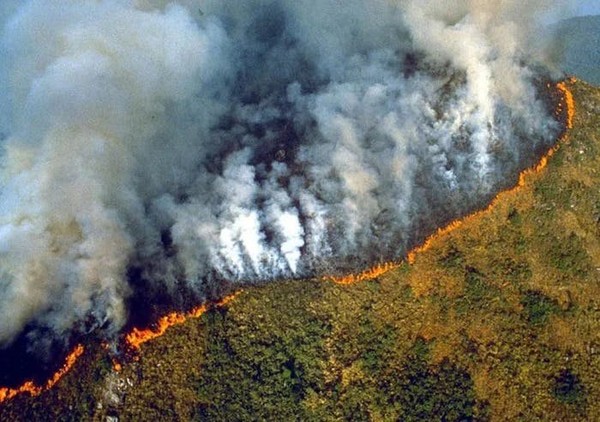President Bolsonaro of Brazil has sought an answer to the country’s underperforming economy in the exploitation of the Amazon. The recent fires engulfing the Amazon rainforest are primarily man-made, a result of massive deforestation that is ongoing in the area. In Brazil, deforestation has been prevalent for many years. National records show that 6,800 square kilometers of the rainforest were cleared of trees this year, a fifty percent jump from last year.
Recent reports say that 400 square kilometers of the deforested area — two-thirds the size of Seoul — was set on fire this August. These burnings, which come together with deforestation, usually take place during the dry season that lasts from August until November. President Bolsonaro, in an effort to diminish the severity of the situation, has argued that the recent burnings are merely wildfires gone extreme. However, researchers from the University of São Paulo have shown that the fires are evidently human-caused due to their unique pattern of spread.
The decreasing frequency and volume of deforestation and burnings over the past decade have been reversed this year, thanks to Bolsonaro. Immediately following his inauguration, the Brazilian president successfully subverted the nation’s environment enforcement body that regulates access to the nation’s rainforests. Furthermore, he publicly supported proposals to develop the Amazon and condoned illegal deforestation. This rhetoric saw farmers, loggers, and miners increase their activities, causing a rise in area deforested this year. Experts contend that if this trend continues, there will be terrible consequences: loss of rich biodiversity, destruction of indigenous territories, and contribution to the global climate crisis, among many others.
Bolsonaro’s intention is clear: to benefit the national economy. He plans to clear much of the Brazilian rainforests to make way for agricultural land on the premise of economies of scale. Bolsonaro’s government also plans to build roads and dams in the Amazon, which will give a chance for the stagnating gold industry to expand once again; all this but at what cost? The dire environmental impacts that come with Bolsonaro’s plans are impossible to dismiss. Shrinking rainforests will cause more frequent and severe floods and droughts, rendering yet more people homeless in a country already stricken with housing problems. Droughts will also seriously diminish agricultural production capabilities. Any economic gain resulting from the focus on industrialization will likely be offset by the cost of disaster relief and decreased agricultural efficiency.

The destruction of indigenous territories is another inevitable consequence of development in the Amazon. Recently, following his rejection of a 20 million USD pledge from the G7 to combat the fires, Bolsanoro publicly denounced remarks by French President Macron as “colonialist”. This seems hypocritical, however, considering his treatment of the Brazilian indigenous tribes.
Bolsonaro’s administration needs to introduce reforms that are more systematic. The country has suffered two years of recession and is currently in economic stagnation. Bolsonaro is one of many figures who rose to power by selling populistic ideology with the lure of imminent economic growth, but this will not realistically come to pass with his current strategy. Brazil’s constitution makes illegal slash-and-burn practices economically beneficial to the partakers; the resale price of illegally acquired land is much greater than the government-imposed fine for slash-and-burn farming in rainforests. Amendment to the constitution is integral to a peaceful resolution.
Brazil cannot maintain its edge in the global market solely by expanding its production sites. There is a clear and quantifiable limit to the nation’s borders, as well as the rainforest’s capacity for recovery. It needs to employ a more sustainable agriculture strategy to increase agricultural efficiency while protecting the rainforest. Brazil must therefore invest in long-term research and development and move away from destructive policies.

